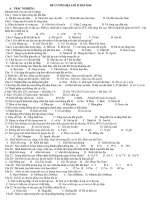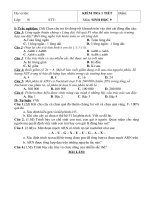Anh 9-Unit 2: LF 4-5Passive(old) - Website Trường THCS Phan Bội Châu - Đại Lộc - Quảng Nam
Bạn đang xem bản rút gọn của tài liệu. Xem và tải ngay bản đầy đủ của tài liệu tại đây (38.82 KB, 6 trang )
<span class='text_page_counter'>(1)</span><div class='page_container' data-page=1>
<b>PASSIVE VOICE</b>
<b>Câu bị động là loại câu mà chủ ngữ không gây nên </b>
<b>hành động, chủ ngữ bị tác động bởi một tác nhân </b>
<b>khác. </b>
<b>* </b>
<b>Quy tắc chuyển sang câu bị động </b>
<b>1. Tân ngữ câu chủ động chuyển sang làm chủ ngữ </b>
<b>câu bị động </b>
<b>2. Động từ Tobe chia theo thì của câu chủ động </b>
<b>3. Chuyển động từ chính thành quá khứ phân từ </b>
<b>(V-ed/V3)</b>
</div>
<span class='text_page_counter'>(2)</span><div class='page_container' data-page=2>
<b>PASSIVE VOICE (Thể bị động)</b>
<b>1. Present simple:</b>
<b>Active: S + V(-s/es) + O</b>
<b>Passive: S +Tobe(am/is/are) +P.P(V-ed/V3) + (by+ O)</b>
<b>Ex</b>: <b>I wash my clothes everyday</b>
<b>My clothes are washed everyday (by me)</b>
<b>2. Past simple:</b>
<b>Active: S </b> <b>+ V-ed/V2 + O</b>
<b>Passive: S +Tobe(was/were)+ P.P(V-ed/V3) + (by+ O)</b>
<b>Ex</b>: <b>I washed my clothes yesterday</b>
</div>
<span class='text_page_counter'>(3)</span><div class='page_container' data-page=3>
<b>PASSIVE VOICE (Thể bị động)</b>
<b>3. Present perfect:</b>
<b>Active: S + have/has + P.P + O</b>
<b>Passive: S + have/has + been+ P.P + (by+ O)</b>
<b>Ex</b>: <b>I have washed my clothes </b>
<b>My clothes have been washed </b>
<b>4. Modal verbs: can, should, may, must, have/has to, </b>
<b>(be going to, will) ,…</b>
<b>Active: S </b> <b>+ can V + O</b>
<b>Passive: S + can + be +P.P(V-ed/V3) + (by+ O)</b>
<b>Ex</b>: <b>I can wash my clothes </b>
</div>
<span class='text_page_counter'>(4)</span><div class='page_container' data-page=4>
<b>a/ They made jean cloth completely from cotton in the 18th</b>
<b>century .</b>
<b>Jean cloth ……….</b>
<b>b/ They grow rice in tropical countries .</b>
<b>Rice ……….</b>
<b>c/ They will produce five million bottles of champagne in </b>
<b>France next year.</b>
<b>Five million bottles of champagne ……….</b>
<b>d/ They have just introduced a new style of jeans in the USA.</b>
<b>A new style of jeans ……….</b>
<b>e/ They have built two departments stores this year.</b>
<b>Two departments stores ……….</b>
<b>was completely made from cotton in the 18th century</b>
<b>is grown in tropical countries.</b>
<b>will be produced in </b>
<b>France </b>
<b>next year.</b>
</div>
<span class='text_page_counter'>(5)</span><div class='page_container' data-page=5>
<b>a/ We can solve the problem.</b>
<b>b/ People should stop experiments on </b>
<b>animals.</b>
<b>c/ We may find life on another planet.</b>
<b>d/ We have to improve all the schools in the city.</b>
<b>e/ They are going to build a new bridge in the area.</b>
<b>The problem can be solved </b>
<b>Experiments on animals should be stopped </b>
<b>Life may be found on another planet. </b>
</div>
<span class='text_page_counter'>(6)</span><div class='page_container' data-page=6>
<b>PASSIVE VOICE (Thể bị động)</b>
<b>3. Simple future:will</b>
<b>Active: S </b> <b>+ wil + V + O</b>
<b>Passive: S + will +be + P.P (V-ed/V3) + (by+ O)</b>
<b>Ex</b>: <b>I will wash my clothes tomorrow </b>
<b>My clothes will be washed tomorrow.</b>
<b>3. Present perfect:</b>
<b>Active: S + have/has + P.P + O</b>
<b>Passive: S + have/has + been+ P.P + (by+ O)</b>
<b>Ex</b>: <b>I have washed my clothes </b>
</div>
<!--links-->









